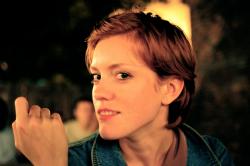
The rock stars at Harpa's Airwords
I used to joke, privately, that there are two kinds of poets in the world: on the one hand, mathematicians, and on the other, magicians. While such simplifications obviously trivialise a craft that is really quite multifarious—I am large, I contain multitudes—I’ve recently come around to thinking there may actually be something to this. At least the part about the magic.
Launched last year by poet and novelist Andri Snær Magnason, Airwords is an attempt to smuggle poetry into a rock-star context. This year’s lineup—which took place in Kaldalón in Harpa in between sets by SMURJÓN, Good Moon Deer, and TINY RUINS among others—featured local legends Sigurbjörg Þrastardóttir, Eiríkur Örn Norðdahl, and Sjón in addition to two hot young things: Icelandic poet Ásta F. Sigurðardóttir and the Danish-Palestinian poet Yahya Hassan.
As evidenced by the crowd on Thursday night, Airwords is a welcome addition to the Airwaves lineup, giving props where props are due to Iceland’s burgeoining literary scene and giving poetry—close-friend and cousin of music—a chance at the limelight. Indeed, the idea of poet-as-rock-star isn’t a very far-fetched concept in Iceland. Outside Kaldalón, people waited in lines that stretched around corners to see 19-year-old Yahya Hassan read from his premier poetry collection, published in Denmark when the poet was only 18 years old. The book, written entirely in capital letters, sold around 32,000 copies in about two weeks, reaching the 100,000 copy mark a few months later (and this in a country of about 5 million).
Hassan undoubtedly has the makings of a literary rock-star. Over the past year he has been the subject of countless interviews in major publications around the world, in which he is invariably described as a “superstar”, “sensation” or a “whiz kid”. But though Hassan has been lauded as an important new voice on the scene, the conversation about Hassan’s work has centered mainly around his criticism of the Muslim religion, in which he was himself raised. The critical comments present in his poetry have provoked death threats and an incident of physical assault against Hassan, as well as legal charges of racism, sparking a fierce debate about free speech.
Taking the stage at Kaldalón wordlessy, Hassan began to chant his poems in a loud, forceful, enunciated Danish, “YAHYA HASSAN”, the title of his collection, emblazoned in white letters on the black background of the book from which he read. Needless to say, the crowd fell gravely silent as he read. His monotonous tone mixing indifference with tangible passion as his words spun a poetic narrative about abuse—physical and emotional—fueled by ideology and poverty.
No one except the technicians seemed to notice that Hassan had gone well over time, suddenly releasing the crowd from his nearly uncomfortable but nonetheless transfixing narrative, and leaving the room.
The set came both in stark contrast to and interesting dialogue with the other newcomer poet who took the stage not long before him, Ásta F. Sigurðardóttir, an Icelandic poet and visual artist whose spontant performances have earned her something of a cult status within the local literary scene.
Full-disclosure: Ásta happens to be one of my best friends. I edited and published her first book of poetry and have been active in the past few years in promoting her career and endorsing her creative potential. So I am not entirely impartial in my coverage here.
Taking the stage unassumingly while it was still being cleared after Good Moon Dear, Ásta began by assuring the crowd that she simply wanted to preface her performance by telling the audience about her plan. Slyly she slipped into a monologue of sorts, a narrative poetic performance wherein her plan, which she had written down in her notebook in what looked suspiciously like a poem, multiplied and grew into a great beast. The imagery became more and more abstract as she dove into her own ambitions, the deepest desires of her creative process. Her tactic for engaging the audience was entirely opposite to but no less successful than Hassan’s. In completely different ways, the two young poets on stage had transfixed their audiences. With seeming effortlessness. With nothing but words. As if by magic.
Buy subscriptions, t-shirts and more from our shop right here!















